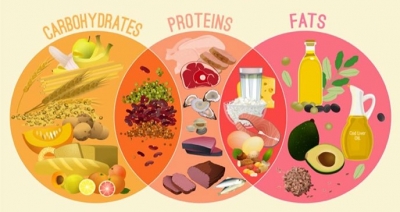
There are six essential types of nutrient that the body needs to work efficiently. Three of them – carbohydrates, proteins, and fats – have to be broken down by the digestive system into simpler substances that can be absorbed into the bloodstream. Vitamins, minerals, and water can be absorbed directly through the lining of the gut.
Carbohydrates
These provide energy for the body. Carbohydrates are the sugars, starches and fibers found in fruits, grains, vegetables and milk products. Though often maligned in trendy diets, carbohydrates — one of the basic food groups — are important to a healthy diet.
Proteins
Protein is a macronutrient that is essential to building muscle mass. It is commonly found in animal products, though is also present in other sources, such as nuts and legumes. Proteins help to build cells and repair damage.
Fats
Fat are an essential part of our diet and is important for good health. There are different types of fats, with some fats being healthier than others. To help make sure you stay healthy, it is important to eat unsaturated fats in small amounts as part of a balanced diet. These provide energy and help the brain and nervous system to work efficiently.
Vitamins and minerals
Micronutrients from vitamins and minerals help body parts to work. Vitamins have different jobs—helping you resist infections, keeping your nerves healthy, and helping your body get energy from food or your blood to clot properly. Minerals also help your body function. Some minerals, like iodine and fluoride, are only needed in very small quantities. Others, such as calcium, magnesium, and potassium, are needed in larger amounts.
Water
Water keeps blood and cells working, and helps to flush out waste. Water along with dissolved electrolytes allows electrical signals to travel along the nervous system. Water delivers dissolved nutrients to cells. Water ferries dissolved waste away from cells.
Picture Credit : Google




